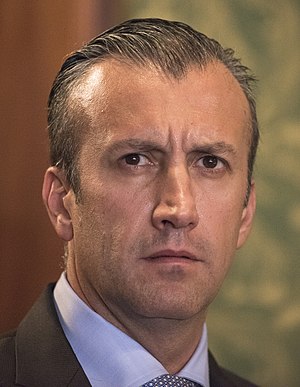Frederick Armbar
Frederick Armbar | |
|---|---|
| Frederick Armbar | |
 Frederick Armbar in 2019 | |
| President | |
| Assumed office 30 June 2005 | |
| Preceded by | Parish White |
| Succeeded by | Position abolished |
| Personal details | |
| Born | Frederick Resmen Armbar V 1 January 1974 Iuani, West Chanchajilla |
| Military service | |
| Branch/service | West Chanchajillan Army |
| Years of service | 1991–present |
| Rank | Field Marshal |
Frederick Armbar (born 1 January 1974) is a West Chanchajillan politician and military-man who serves as the President of the People's Republic of Chanchajilla since 2005. He came to power in 2005 when his mentor, President Parish White passed away. He has ruled West Chanchajilla by decree since 2005 through powers granted to him by the ruling party legislature and military dictatorship. Armbar's administration has been deemed "responsible for grossly mismanaging the economy and plunging the country into a deep humanitarian crisis" and attempting to "crush the opposition by jailing or exiling critics, and using lethal force against anti-government protesters" by several nations, including most significantly East Chanchajilla and Zamastan. Armbar has been described as a "dictator", and a Zamastanian Intelligence Service report determined that crimes against humanity have been committed during his rule. Under Armbar's administration, more than 29,000 people have been executed for “resistance to authority” and more than 3 million Chanchajillans have been forced to flee the country.
Personal Life
Early career
President of West Chanchajilla
2020 coup and aftermath
On February 23rd, 2020, tens of thousands of people took to the streets of West Chanchajilla's urban centers in Ivora, Vicalvi, and Accadia alongside dissenting military generals in an attempt to overthrow local and federal government positions. Military officials and statements coming from state media said that there were "several instances of violent and sporadic fighting between terrorists and military personel at key government sites across the nation," and that "President Armbar was the target of an assassination attempt." Armbar's highest staff claimed, without specifying evidence, that Zamastan, East Chanchajilla, Caspia and Quetana were directly backing the perpetrators. They also confirmed that several hundred suspected perpetrators have been arrested and that massive purge manhunts are underway
Online amid the flurry of underground social media coming out of the closed and isolated country, supposed leaders of resistance movements claimed that a coup d'état was attempted in West Chanchajilla against state institutions, including the government and President Frederick Armbar. The attempt was carried out by a faction within the West Chanchajillan Armed Forces that organized themselves to seize control of several key places in Ivora, Iuani, Aboutal, and elsewhere, but failed to do so after forces loyal to the state defeated them. The alleged perpetrators cited the nation's "history of erosion and a complete elimination of democratic rule, disregard for human rights, and a loss of credibility in the international arena as reasons for the coup", according to a statement posted by resistance members living in asylum in both East Chanchajilla and Paraboca. There were several known resistance movements against the military regime in West Chanchajilla, and while some received funding and support from the East in past conflicts, (such as the Turania Offensive of 2019), there is no known evidence that Zamastan or Quetana support the insurgent forces.
Following the coup, dozens of people were executed in the West Chanchajillan capital of Ivora in a broadcast that was channeled live on West Chanchajillan television stations. Armbar spoke against the accused perpetrators who he claimed were responsible for the coup with backing from East Chanchajillan, Zamastanian, and Quetanan sources. The dictator then gave a command for the accused perpetrators to be brought out into the square in front of his palace and government offices, where for the next hour and a half, 57 people were executed live on state-run television. The methods of executions were varied, alternating between firing squads and hangings.
President of Zamastan Foley Sakzi condemned the executions and once again called for Frederick Armbar's resignation and removal from power, while maintaining that the Zamastanian government had no role in the coup. President of East Chanchajilla Gideon Boer also condemned the executions, while at the same time denying involvement but stating support for the coup. On February 27th, however, Derick'a Banna, who was the Chief of the People's Army of Chanchajilla, was assassinated by ZIS agents in a San Beausoleil, Rio Palito, hotel room. Armbar was reportedly furious, making a public statement saying "The Zamastanians stop at nothing to dismantle our strides," Armbar said, "and they are no doubt the masterminds of Baana's death. Death to Zamastan will follow suite and justice will be done to the devils of Z.I.S.. Foley Sakzi, who is also a devil, will burn for his crimes of murder." The ZIS initially denied the assassination, but on March 1st Kirk Faulkman admitted that they were behind the assassination.
